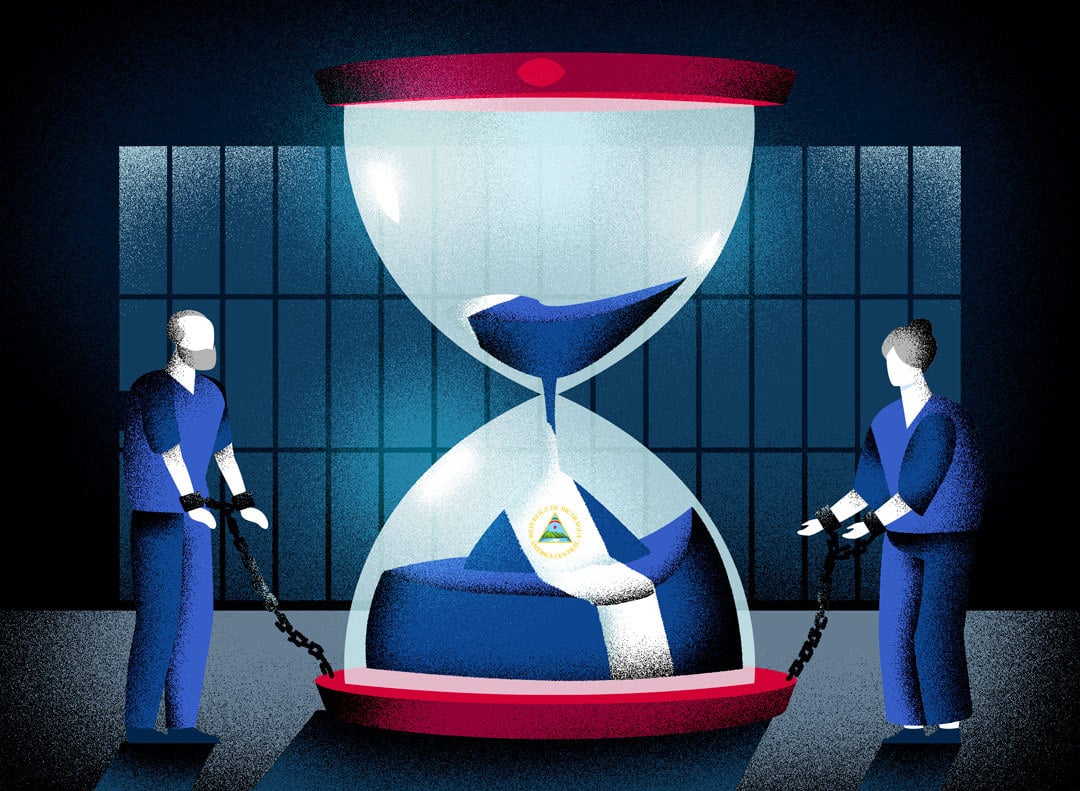When the political prisoners Arturo Cruz and José Pallais, both 68 years old, had a judicial hearing on Monday, February 21, police officers transferred them early from their home to the El Chipote prison, where they were forced to enter a cell and to dress in the blue prison uniform that the authorities have made a badge for opponents accused of “terrorism” since 2018.
The Nicaraguan Center for Human Rights (Cenidh) characterized the actions of the authorities against former presidential candidate Cruz and former deputy Pallais as “degrading treatment” and demanded the release of the 177 political prisoners of the regime of Daniel Ortega and Rosario Murillo, while recalling that three days earlier, after a prolonged confinement of more than eight months, Cruz and Pallais had been sent home after the change of precautionary measure, ordered on February 18.
This week they were sentenced before a judge for having committed the alleged crime of “conspiracy to undermine national integrity”, a process in which they were found guilty and which lasted in marathon hearings for a week, in which the only evidence presented against them, and five other defendants, were the testimonies of police officers and the existence of a WhatsApp group apparently used to “conspire.”
Although they are no longer under the torture regimen of the El Chipote cells, sources familiar with the house arrest explained that they are subjected to total isolation in their homes. “They don’t have cable service, they can’t watch television, nor the Internet, nor landlines or cell phones, nor access to computers, in their house there is no electronic device that allows you to communicate abroad. They are completely isolated,” they reported.
Family restrictions extended
CONFIDENTIAL learned that lawyers are not allowed access to their clients even when they have been transferred to their residences, the restrictions are such that inmates are not allowed “not even to sunbathe in the patio of their property, although they are allowed move around in your house.
However, the notable difference with preventive detention is that in their homes prisoners of conscience have access to their own food and family care, and that the visiting regime is daily at the rate of one hour per family member, instead of the 45 days tax in El Chipote. In other cases, relatives who live in the prisoner’s house can leave for periods of time stipulated by the Police, but when they enter the house the officers prevent them from doing so with their cell phones.
House arrest is regulated in two ways in the Nicaraguan Criminal Procedure Code. It can be granted with the custody of someone who is responsible for the prisoner not escaping and there is also the possibility that it will be imposed to replace preventive detention.
The United Nations Minimum Rules for the Treatment of Prisoners “Nelson Mandela” They ensure that all detainees must be treated with respect for their dignity and will not be subjected to cruel punishment or inhuman or degrading treatment. It is the responsibility of the State to provide medical services to detainees and it must be guaranteed that the windows where they live or work are large enough (as well as artificial light) so that they can read, among other universal rights.
In Nicaragua, according to the recognition mechanism for political prisoners, there are 177 prisoners of conscience. Of them, nine are under house arrest, such as the former presidential candidate, Cristiana Chamorro Barrios, 68, whose case in the case of the Violeta Barrios de Chamorro Foundation was reactivated by the Prosecutor’s Office and a hearing was scheduled for on March 3 at 8:30 in the morning.
Political commentator Jaime Arellano, former deputy María Fernanda Flores and former presidential candidate Noel Vidaurre, aged 62, 54 and 66, respectively, are also in the same prison situation at home.
After the national and international impact that the death in captivity of General Hugo Torres, 73, had on February 11, the authorities ordered that the precautionary measures be changed for Cruz, Pallais, former Foreign Minister Francisco Aguirre Sacasa, and on Thursday, February 24, they added to the list to former ambassadors Edgar Parrales and Mauricio Diaz. Above all of them, their relatives and human rights organizations had warned of signs of deterioration in his health.
Lawyers consulted by CONFIDENTIAL They insisted that the political prisoners are innocent and what should proceed is the annulment of the trials and their immediate and unconditional release, while they explained that the State has responsibility for their health, regardless of whether they are in El Chipote, in the prison system or in their homes.
Alexandra Salazar, a member of the Legal Defense Unit, a group of lawyers specialized in human rights that has been defending political prisoners since 2018, explained that house arrest is technically a substitute measure for preventive measures, as stated in the Code of Criminal Procedure.
State “keeps them isolated”
Salazar questioned the “total isolation” to which they are subjected in their homes due to “wide police protection.” “We understand that they took away the Internet, access to fixed telephony, cell phones, there is total isolation from the family, from their environment. Those sanctions to the family should not be”, said the jurist.
Lawyer Salazar assured that, given the lack of access to information in the files by the defense attorneys, it is not possible to know exactly the criteria of the courts in applying the change of precautionary measure. The version that we have are the communiqués of the Public Ministry where they allege “humanitarian reasons”.
However, the relatives of the prisoners of conscience have insisted that a medical assessment be made of the older adults arrested, which they were 21 until february 18. However, that is not happening.
“Several of the people detained in El Chipote are not fit to be inside a prison, they should have alternative measures granted such as house arrest. In several cases there have been incidents due to illness or valetudinarians and the authorities have failed to respond”, lamented Salazar.
The right to medical care
For his part, former departmental prosecutor Boanerges Fornos insisted on the urgency and importance of people under house arrest having access to medical care, which is a right.
“As these citizens are still under prosecution, they should have the possibility of having medical care, perhaps not moving to another place, but the doctor could come to visit them at their home facilities. And if he requires any analysis that he needs, for example, transfer him to a medical center, he should be transferred and the judge should not deny that possibility, “Fornos suggested.
For the former prosecutor, when a justice system works properly, it would be enough to make a request to the court: the forensic medical assessment first, but what is likely to happen in the country is that these requests are denied or the forensic experts themselves do not carry out the evaluations with which the right to health would be denied by abiding by “guidelines”.
Fornos said that, unlike the prisoners of conscience in El Chipote, those who are at home have access to a more balanced diet, to care for their family and said that this cannot be restricted under any point of view, they should still to be able to meet with his lawyers without any restriction, but he recognizes that in this, too, the actions of the authorities may be “arbitrary”.
“The responsibility of the State remains the same, even if they are in jail at home. It must be guaranteed that the detainee has access to a doctor and medicine. With the food issue, there is not so much anymore because the family is the one that is giving him his food. But the health issue, access to hospitalization when required, is the responsibility of the State, as well as the right to physical integrity and life”, the criminalist insisted.








